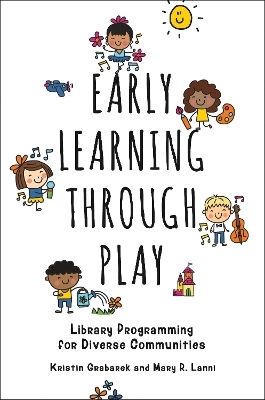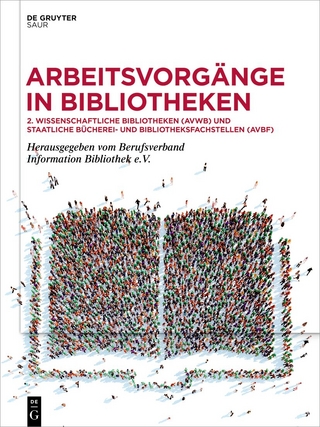
Early Learning through Play
Libraries Unlimited Inc (Verlag)
978-1-4408-6582-4 (ISBN)
While traditional library storytimes are excellent tools for families, equally important is play. Children learn through play in many ways; it stimulates exploration and curiosity and builds gross and fine motor skills that are critical to reading and writing success. Perhaps most importantly, play has the power to cross barriers of culture and language, allowing families from differing backgrounds to learn together.
In this book, Kristin Grabarek and Mary R. Lanni—the pioneers of Little University, an early learning program that focuses on play-based learning—share their experiences and provide guidance for implementing similar programs at libraries of various sizes and budgets. They teach readers how to create programs for a diverse group of families, work with outside providers, choose supplies, estimate costs, market your programming, and overcome the challenges of both big and small budgets and many or few patrons. These practical plans will enhance storytimes and even help build a brand-new early learning program.
Kristin Grabarek implemented Little University, an early learning program beyond traditional storytime, at her branch of the Denver Public Library system and is now assisting in its expansion to multiple branches throughout the system. Mary R. Lanni is a library professional in Denver, Colorado, providing library and programming services for all ages for more than five years.
One Introduction
What Is Early Learning?
Public Library's Role in Early Learning
Every Child Ready to Read (ECRR1 and ECRR2) @ Your Library
About Us
Learning through Play
How Play Supports the Rest of ECRR2
Participants in a Traditional Storytime
In Defense of Storytimes
A Play-Based Learning Alternative
In Summary
Two Creating an Early Learning Program Series
Original Creation of Play-Based Early Learning Programs
Little University: A Note on Kristin's Library Community
Family Literacy: A Note on Mary's Library Community
Considerations for Creating Play-Based Programs in Your Library
Cultural Awareness
Marketing
Word of Mouth
Print Collateral
Following Up
Scheduling
Building a Core Group of Participants
How to Structure the Program Series
How the Program Supports Social-Emotional Skills
The Importance of Learning Together
One Last Note
In Summary
Your To-Do List
Three Implementing the Program Series with a Budget
The Conundrum of Free Things
Your Program Series Reflects Your Community
How to Approach Community Partners
Developing Programs with Community Partners
Movement Programs
STEM Programs
Art Programs
Health and Nutrition Programs
Wellness Programs
In Summary
Your To-Do List
Four Early Learning Programs for Tiny or Nonexistent Budgets
Tiny Budgets as an Opportunity
DIY Programming Examples and Resources
Movement Programs
Art and Craft Programs
Community Programs and Destination Storytimes
STEM Programs
Wellness Programs
Language and Cultural Programs
In Summary
Your To-Do List
Five Conclusion
Where We Are Now
Maintaining Relevance
What to Do Next?
Looking Ahead: How to Continue Building Your Program
Early Learning Progress Report
Surveys and Incentives
Little University for Grown-Ups
Kindergarten Readiness Checklist
Graduation
In Summary
Appendix A: Elevator Speeches
Appendix B: Need to DIY? Twenty Titles to Build an Early Learning Program Series Reference Collection
Appendix C: Program Flyer Template
Bibliography
Index
| Erscheinungsdatum | 18.03.2019 |
|---|---|
| Sprache | englisch |
| Maße | 156 x 235 mm |
| Gewicht | 340 g |
| Themenwelt | Sozialwissenschaften ► Kommunikation / Medien ► Buchhandel / Bibliothekswesen |
| Sozialwissenschaften ► Pädagogik ► Vorschulpädagogik | |
| ISBN-10 | 1-4408-6582-5 / 1440865825 |
| ISBN-13 | 978-1-4408-6582-4 / 9781440865824 |
| Zustand | Neuware |
| Haben Sie eine Frage zum Produkt? |
aus dem Bereich


